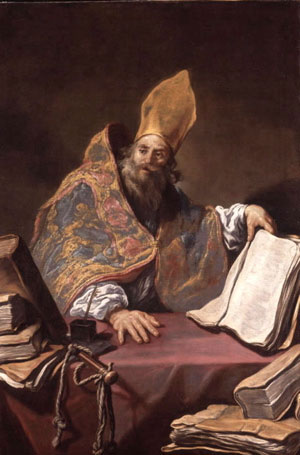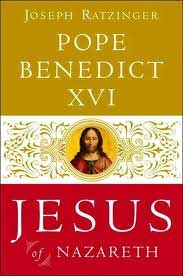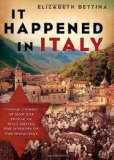Dr. Matthew Bunson discusses the life, times and teachings of St.  Ambrose of Milan (part  1)
[powerpress]
Until that moment, Ambrose had been the most senior magistrate of the Empire in northern Italy. Culturally well-educated but at the same time ignorant of the Scriptures, the new Bishop briskly began to study them. From the works of Origen, the indisputable master of the “Alexandrian School”, he learned to know and to comment on the Bible. Thus, Ambrose transferred to the Latin environment the meditation on the Scriptures which Origen had begun, introducing in the West the practice of lectio divina. The method of lectio served to guide all of Ambrose’s preaching and writings, which stemmed precisely from prayerful listening to the Word of God. The famous introduction of an Ambrosian catechesis shows clearly how the holy Bishop applied the Old Testament to Christian life: “Every day, when we were reading about the lives of the Patriarchs and the maxims of the Proverbs, we addressed morality”, the Bishop of Milan said to his catechumens and neophytes, “so that formed and instructed by them you may become accustomed to taking the path of the Fathers and to following the route of obedience to the divine precepts” (On the Mysteries 1, 1). In other words, the neophytes and catechumens, in accordance with the Bishop’s decision, after having learned the art of a well-ordered life, could henceforth consider themselves prepared for Christ’s great mysteries. Thus, Ambrose’s preaching – which constitutes the structural nucleus of his immense literary opus – starts with the reading of the Sacred Books (“the Patriarchs” or the historical Books and “Proverbs”, or in other words, the Wisdom Books) in order to live in conformity with divine Revelation.
It is obvious that the preacher’s personal testimony and the level of exemplarity of the Christian community condition the effectiveness of the preaching. In this perspective, a passage from St Augustine’s Confessions is relevant. He had come to Milan as a teacher of rhetoric; he was a sceptic and not Christian. He was seeking the Christian truth but was not capable of truly finding it.
What moved the heart of the young African rhetorician, sceptic and downhearted, and what impelled him to definitive conversion was not above all Ambrose’s splendid homilies (although he deeply appreciated them). It was rather the testimony of the Bishop and his Milanese Church that prayed and sang as one intact body. It was a Church that could resist the tyrannical ploys of the Emperor and his mother, who in early 386 again demanded a church building for the Arians’ celebrations. In the building that was to be requisitioned, Augustine relates, “the devout people watched, ready to die with their Bishop”. This testimony of the Confessions is precious because it points out that something was moving in Augustine, who continues: “We too, although spiritually tepid, shared in the excitement of the whole people” (Confessions 9, 7).
For more visit Vatican.va
Dr. Matthew Bunson, Senior Fellow of the St. Paul Center for Biblical Theology, is one of the United States’ leading authorities on the papacy and the Church.
His books include: The Encyclopedia of Catholic History; The Encyclopedia of Saints; Papal Wisdom; All Shall Be Well; Encyclopedia of the Roman Empire; and The Angelic Doctor: The Life and World of St. Thomas Aquinas; The Pope Encyclopedia; We Have a Pope! Benedict XVI, the first Catholic biography of the Holy Father in the English language; the Encyclopedia of U.S. Catholic History; Pope Francis. Â His also the editor of OSV’s “The Catholic Answer” magazine.
Tags: Church, Italy, matthew bunson, Milanese Church, testimony, Wisdom Books
This entry was posted on Sunday, October 20th, 2013 at 8:56 pm
You can follow any responses to this entry through the RSS 2.0 feed.
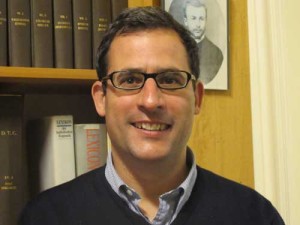 On October11, 2012,  I began recording a new series that will soon begin airing on Discerning Hearts with Dr. Adrian Walker, which we recorded at “Casa Balthasar“,  a house of discernment for men located in Rome, Italy, where he was offering instruction.  Adrian served as the English translator of Pope Benedict XVI’s  book “Jesus of Nazareth” . With  the historic events occurring with the Synod on the New Evangelization and start of the Year of Faith, we took some time aside to discuss that work and the influence of our Holy Father.
On October11, 2012,  I began recording a new series that will soon begin airing on Discerning Hearts with Dr. Adrian Walker, which we recorded at “Casa Balthasar“,  a house of discernment for men located in Rome, Italy, where he was offering instruction.  Adrian served as the English translator of Pope Benedict XVI’s  book “Jesus of Nazareth” . With  the historic events occurring with the Synod on the New Evangelization and start of the Year of Faith, we took some time aside to discuss that work and the influence of our Holy Father.
[powerpress]
You can find the book here
The Casa, located in Rome, was founded in 1990 by a group of friends  and is 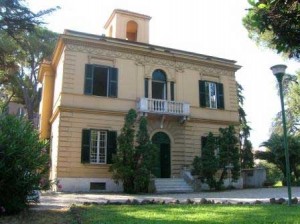 directed by Rev. Jacques Servais, S.J.;  Joseph Ratzinger (Pope Benedict XVI) has been closely associated with the Casa Balthasar from the very beginning as its Cardinal Protector.
directed by Rev. Jacques Servais, S.J.;  Joseph Ratzinger (Pope Benedict XVI) has been closely associated with the Casa Balthasar from the very beginning as its Cardinal Protector.
Tags: Adrian Walker, holy father, Italy, pope benedict
This entry was posted on Wednesday, October 24th, 2012 at 12:24 am
You can follow any responses to this entry through the RSS 2.0 feed.
Elizabeth Bettina tells the tale of the people of Campagna, her grandmother’s village, that she would visit every 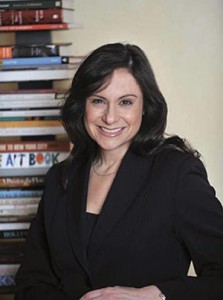 summer as a child. Elizabeth discovered only as an adult, that those villagers had a little known secret: they had defied the Nazi occupiers and protected hundreds of Jews during the holocaust. Elizabeth would go on to uncover the fascinating untold stories of Jews throughout Italy during WWII and the goodhearted Italian people who risked everything to save them. A heartwarming, as well as heartbreaking at times, account of the courageous efforts of neighbor truly helping neighbor in wartime Italy.
summer as a child. Elizabeth discovered only as an adult, that those villagers had a little known secret: they had defied the Nazi occupiers and protected hundreds of Jews during the holocaust. Elizabeth would go on to uncover the fascinating untold stories of Jews throughout Italy during WWII and the goodhearted Italian people who risked everything to save them. A heartwarming, as well as heartbreaking at times, account of the courageous efforts of neighbor truly helping neighbor in wartime Italy.
You can find more at www.elizabethbettina.com
[powerpress]
Tags: campagna, catholic, catholic podcast, catholic prayer, cathollc spirituality, elizabeth, Elizabeth Bettina, holocaust, Italy, jews during the holocaust, Pages Elizabeth Bettina, wartime italy, WWII
This entry was posted on Thursday, September 9th, 2010 at 9:13 am
You can follow any responses to this entry through the RSS 2.0 feed.


